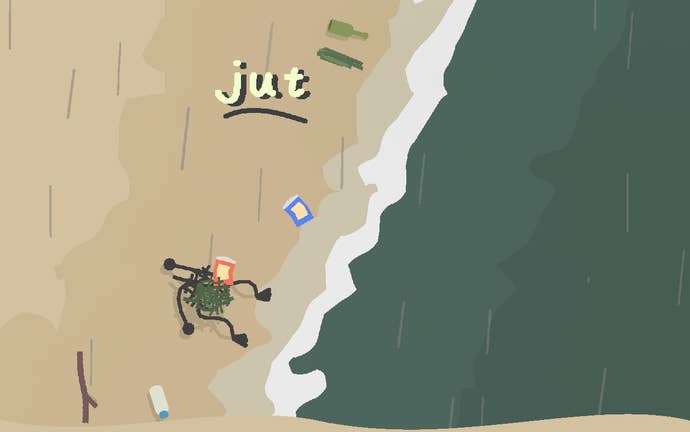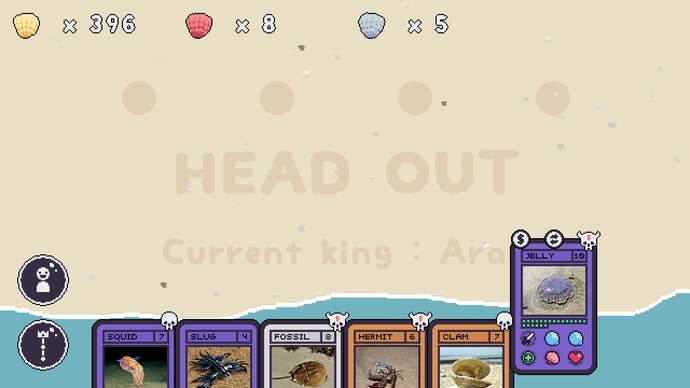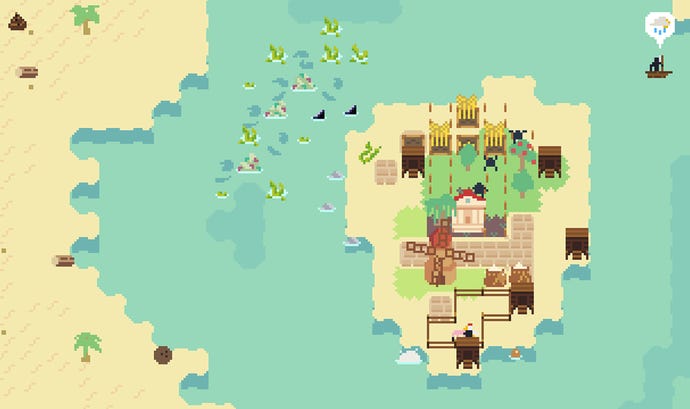How Sokpop Collective Found a Way to Make Small Games for a Living With Patreon
Meeting the "Game Dev Boy Band" who have rewritten the rules of sustainable indie game development.
This article first appeared on USgamer, a partner publication of VG247. Some content, such as this article, has been migrated to VG247 for posterity after USgamer's closure - but it has not been edited or further vetted by the VG247 team.
The last time I caught up with the fellas that make up Sokpop Collective, it was well over two years ago on Skype. The Netherlands-based foursome were fresh off their music-inspired project Bamboo EP, a game that would end up being structured in a way not unlike what would become their Patreon model over a year later.
Now here we are at this year's Game Developers Conference. It's been nice all week, except for the day we've arranged to grab coffee; it's drizzling rain now, and even the makeshift picnic tables hosted by GDC in the nearby Yerba Buena Park are now vacant and drenched. It's the opposite atmosphere you'd imagine when looking upon Sokpop's games. Its games have a fascination with low-poly and lo-fi aesthetics, but it's not a style etched in stone for its dense library. The characters that star in them are usually cute, perky, and wobble a lot, customary of the group's knack for game physics and idle animations.
Before we head to one of the sheltered outdoor tables, one of them jokes that I should have them each riddle off what they're drinking. So I do: Aran Koning is drinking a black tea, Tom van den Boogaart a medium cappuccino, Ruben "Rubna" Naus a drip coffee, and Tijmen Tio a medium iced cold brew. In stark contrast, I'm sipping an over sweetened iced white chocolate mocha.
January 2019 marked one year of Sokpop Collective's groundbreaking Patreon, a subscription service wherein they release two games every month. (That's one every two weeks.) The games are small in scope—well, mostly—but are all singular. Just as they once did with Bamboo EP's minigame collection centered around the idea of bamboo, Koning, Boogaart, Naus, and Tio make games for the subscription on a turn-basis.
"We keep each other in check. We just have this rule where you don't spend more than four weeks on a game," says Tio. Sheepishly after, he admits that for his game Featherfall, a Soulslike action-RPG, he actually did spend well more than four weeks on it. When things like that come up, or like the time Koning went on vacation to Japan, the schedule gets shuffled around accordingly.
Sokpop are here because they were invited to give a talk at GDC about their past year on Patreon. "It was really nice for us because it made us really think about what happened the last year and realized what we had actually learned," says Koning. "It was like a super nice way to sort of look back at what happened."
The talk itself, led by just Koning and Tio, was a beat by beat timeline of Sokpop's debut year with a Patreon subscription. In subbing to Sokpop's Patreon at the $3 tier, subscribers get a new game every two weeks. The new games also go up on the collective's itch.io page for $3 each. On stage, they liken it to a magazine subscription. For $10, subscribers can also get access to each game's source code, a decision that arose from a desire to initially make tutorials to help budding game developers, and realizing that would be too time-consuming.
"A lot of the people that follow us make games themselves or want to make games," says Tio. "Someone did ask us, like why would you do that? Aren't you afraid that someone's going to steal your work? But the code isn't that valuable," they all laugh. "It's not the best code either. It's hard to read, and it's just a few weeks of work. And the design, well people can always steal that."
The revenue made from game sales on itch.io and Patreon subscriptions is split evenly among the four, and helps pay for the office space they rent too. Despite the individual nature of each game the foursome releases, for them, the decision came naturally.

"We wanted Sokpop to be like a way to be more visible for us all," says Koning. "We also had this idea like, oh we can sort of split the risk." Splitting equally, they tell me, just feels fair, as they're all putting in equal amounts of work and are working together as a collective. Sokpop, essentially, operates as a co-op, even if it isn't a proper studio in the traditional sense.
"And also it would be a lot of work to split all the revenue," says Naus.
They all laugh. "Yeah, it's the easy way out," Tio adds.
Some games have become unexpected hits, like last summer's Simmiland, a game made by Tio. It sold a lot on itch.io, partially driven by YouTubers and streamers taking a liking to the digital card game, making $10,000 in just a month. Simmiland is one of the few games that has been expanded from its original release through the Patreon.
"If a game feels like it could have a lot more to it, like there are some games that you make them in four weeks and you're like, 'I could add some things but not really sure what.' And then there's just some games where you're like, 'oh I could add this and this and this,'" says Koning. "And then you could just get a bunch of ideas and I always feel like if we're that excited about something, then there must be more to it."
If you skim the itch.io page for Sokpop Collective, you'll find how off the wall each game of the past year-plus is. In its Patreon year, the group's made a Sims-like game with llamas, an online strategy game, a railroad management sim, a fixie bike street racing game, a dodgeball game, a "sitcom game" starring a fish named Blubber, and, obviously, much more.
The ideas for games, they tell me, actually come naturally. It's the execution where problems arise. Since a road bump hit last year where they ran out of their "buffer" games in October 2018—of which they had eight games created before launching the Patreon as back-ups in the event of delays or emergencies messing up the schedule—they enacted a new internal rule: No more restarting projects, and even bad ideas might have a kernel of good to them. Even without the safety net, the Sokpop Patreon has carried along as always.
As we talk, Sokpop bounce off each other's sentences with ease; finishing unspoken thoughts with a chorus of nods from the others. When I ask if being here at GDC 2019 is going to affect their schedule, they shrug, but admit that it probably will a teensy bit.
"I still don't know what my next game is going to be," Boogaart says.
Naus agrees. "No, me either."

To point to a favorite Sokpop game is hard for the team. In all cases, they mention games one another has made rather than ones they personally did first. King of the Sandcastle, one of Tio's games, is a big favorite in the group. The dungeon crawler was released early in the Patreon's lifespan. In the Pokemon-like battles, if your dealt card dies or becomes a boss, it will then be an enemy for other players to encounter in the world. "I think we lost like a full work week just like playing that, because it's like kind of grimey, but in a good way," says Koning with resounding nods from around the table. Boogaart affirms this. "It was cool," he says, "because we could just tell you what to make, and you would probably add it."
As for games they themselves made, Koning favors Skidlocked, which he is developing into a more fully-featured game at the moment as his current big project. Boogaart loves the wobbly kart racer Kart Kids, which only came out recently, but it's "already" his favorite—though he does express that he wishes he was able to make more tracks for it.
Tio's proud of the Soulslike he made, Featherfall, while Naus is happy with the capybara ice hockey game Capy Hoky because of the purity of its design. This surprises his colleagues, who suggest the train-centered Soko Loco or the spider web-weaving Spider Ponds as alternatives before he thinks of his own answer. "You make too many good games, it's not fair," says Koning. "We're just out here strumming, and Ruben just makes a great game every time."
In the span of one year, Sokpop Collective released 26 games, but the number's gotten a lot higher since that one year anniversary. Since I interviewed them at GDC 2019, then fresh off the release of Kart Kids, they've already released two more games: Bandapes, a "rhythmic battle game," and Sok-Stories, a game creation tool. For a foursome that met in 2014 through participating in game jams, it's a staggering achievement. During their talk at GDC, they tout that their actual biggest achievement is how they've somehow not burnt out in ensuring that everyone takes evenings and weekends off even in the Patreon rush.
"At the moment, we're almost sustainable through it. So, I think now there's no real reason to not do this," says Tio. "So for at least a long while, we're probably going to do this unless something happens. [...] It's always been kind of our dream, you know? It's a common dream, as well, to just make small games and be able to live off that, and we finally found a way to do that. So we're just doing it and having fun with it for as long as we can." At the time of this writing, Sokpop's Patreon makes $3,839 each month, with a current goal of $5,000 a month to help account for all its costs and help pay a livable wage to all the members.
As for the future, the Sokpop Patreon has proven itself to be a mighty successful experiment. Not just in the sheer volume of games released, but also in how it's been a learning experience for the four game developers. Working at a rapid pace as they do with the Patreon, Koning tells me, has helped them see their progress as gamemakers over the past year; something that may not be as evident when working on a single project.
For now, aside from Patreon obligations, Sokpop are working on bigger versions of games originally released through the Patreon, like of Skidlocked and Soko Loco ("the biggest feature creep game," according to Haus), as well as the adventure game Bernband. The week at GDC has been increasingly surreal for the group, with many approaching them as fans of their work.
Partially to thank for that is their "Game Dev Boy Band" persona, which spawned from something someone said on Twitter, and not an affinity for pop music as I assumed. When I ask how the phrase says, Tio says matter-of-factly, "Have you seen us?" And it's true: they're four well-dressed young men that you could easily place for a boy band, if you were to attribute any group title to them.
"I think there's a bunch of game developers now that have this public appearance that they kinda use, like Toby Fox from Undertale," says Tio. "He was a very mysterious person people talked about, like who is this person? And it had nothing to do with the game at all. But it still created some…"
"Buzz," says Naus, finishing Tio's train of thought.
It's worked too. "Game Dev Boy Band" has become synonymous with the guys of Sokpop. In an alternate universe, you could almost imagine them on the cover of preteen focused magazine with subheads like "10 Things We Learned About Sokpop After Looking Through Their Source Codes," rather than the usual gossipy things.
"We did one fan photo," says Tio of the people who have approached them this week. He says it a little proudly, but also a little jokingly. "So it's becoming real now."


